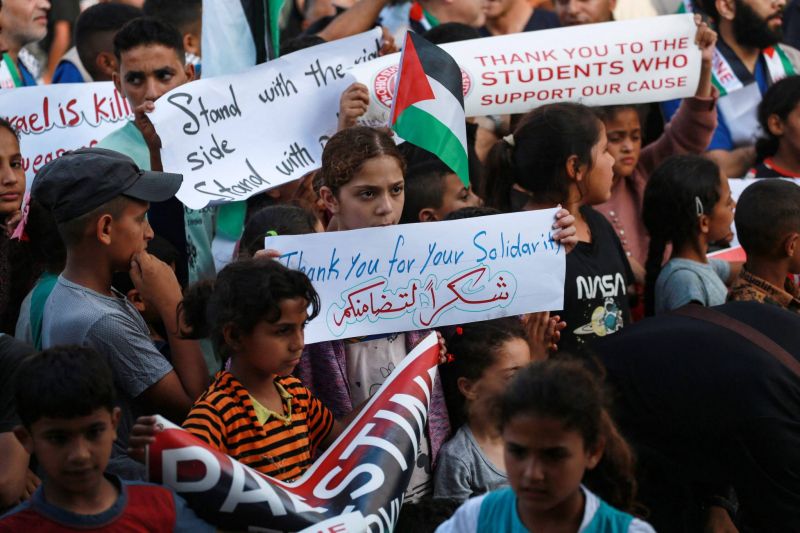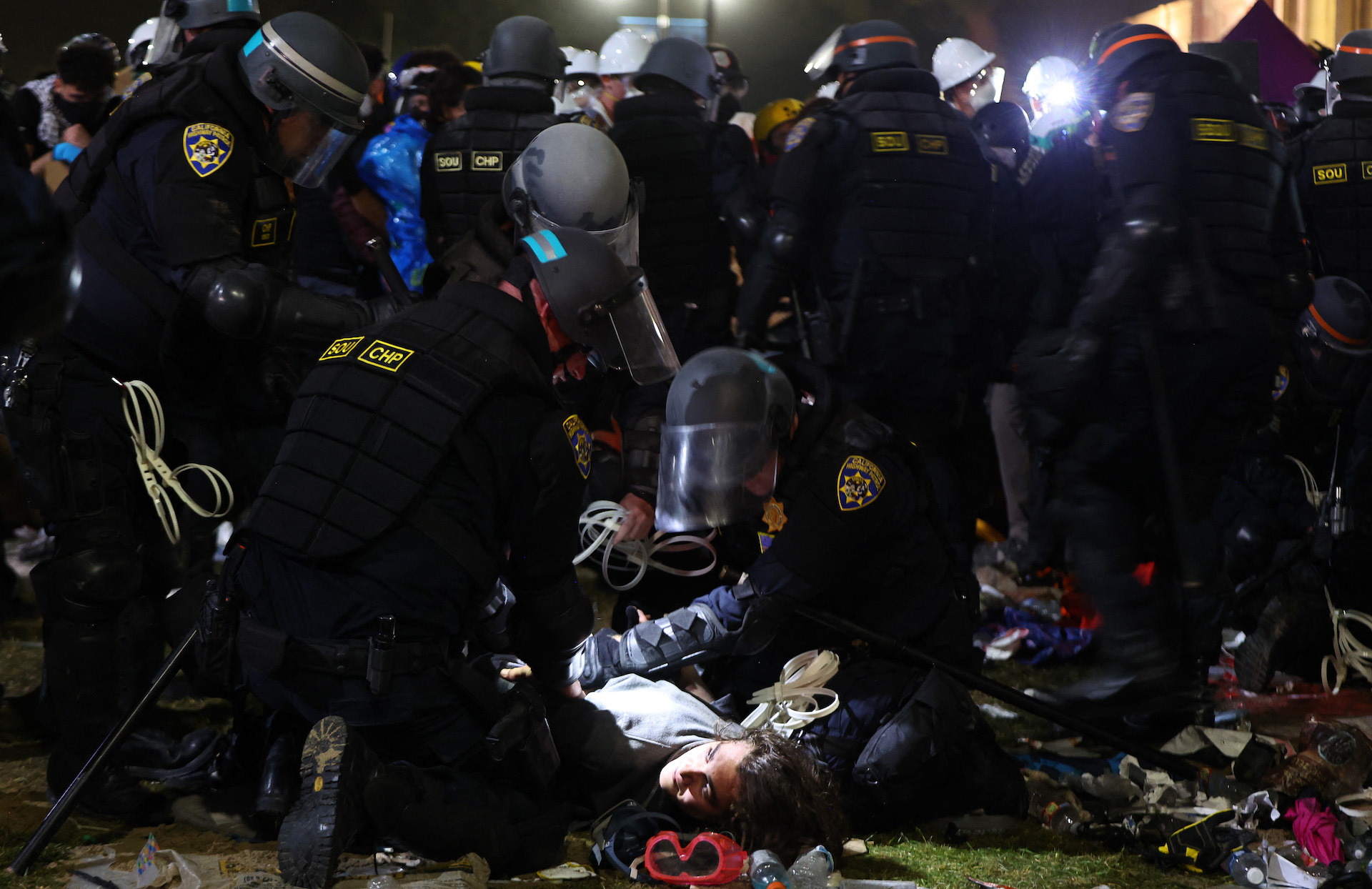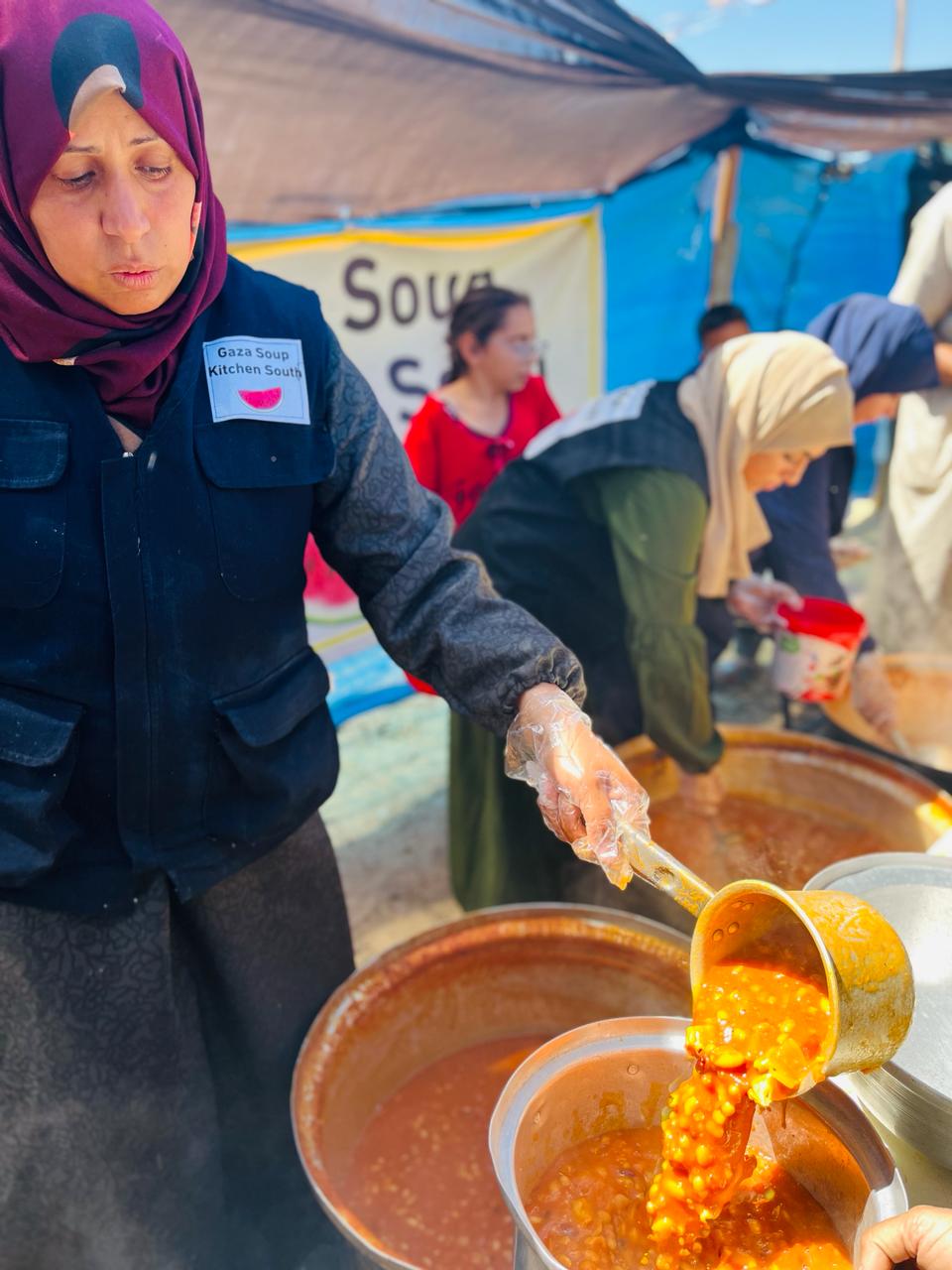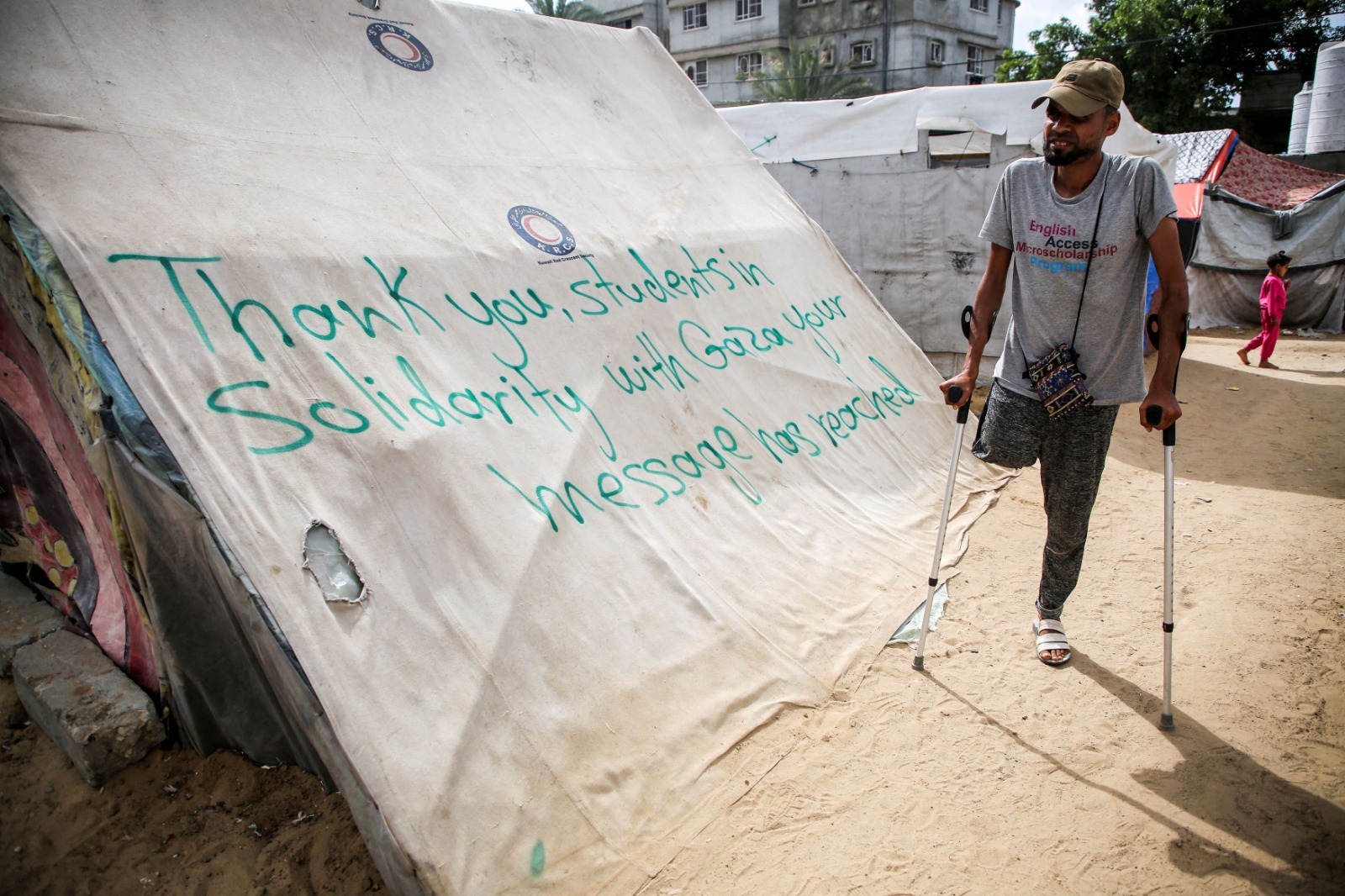
Palestinian children raise placards thanking pro-Palestinian student solidarity initiatives in US and Canadian universities on their campuses, during a rally in Deir el-Balah in the central Gaza Strip on May 1, 2024. (Credit: AFP)
On Oct. 7, Noor Alyacoubi, a translator and a mother of a six-month-old baby, woke up to the sound of heavy explosions. She turned on the television to find war had come to her doorstep in Gaza
As the months stretched on and her baby turned a year old, that war became a bloodbath. More than 34,000 people have been killed in Israeli strikes, over half of them women and children.
“During the past months, I have endured the worst days of my whole life; away from my family and my job. I witnessed terror and horror and experienced famine and starvation,” Alyacoubi tells L’Orient Today by phone from her home in the northern Gaza Strip.
She stayed in that part of Gaza with her husband and baby daughter, while her family fled to the south of the Gaza Strip to escape the approaching Israeli tanks, their home destroyed by an Israeli strike in March. “A four-story building was leveled to the ground with all the memories, the architecture, the pictures and my grandparents’ ancient history,” Alyacoubi says. Another Israeli strike also wiped out the family’s textile business.
Amid it all, Ayacoubi and others are now watching from afar as a widespread student protest movement in solidarity with Palestinians is growing in the United States and worldwide.
She says it’s a glimmer of hope.
Swelling protests
Pro-Palestinian protests on university campuses ignited in the United States on April 17, 2024, before spreading to other countries. They began after there were mass arrests at Columbia University after protesters demanded the university's disinvestment from Israel over what they are calling a genocide against Palestinians.
 California Highway Patrol (CHP) officers detain a protestor while clearing a pro-Palestinian encampment after dispersal orders were given at the University of California, Los Angeles (UCLA) campus, on May 2, 2024 in Los Angeles, California. (Credit: Mario Tama/AFP)
California Highway Patrol (CHP) officers detain a protestor while clearing a pro-Palestinian encampment after dispersal orders were given at the University of California, Los Angeles (UCLA) campus, on May 2, 2024 in Los Angeles, California. (Credit: Mario Tama/AFP)
“The matter of the students protesting in all countries lifted the spirits of Gaza residents and gave hope…that there are people who know our news, follow us and are concerned with our cause,” journalist Esraa Alareer tells L’Orient Today.
Alareer lives — and is trying to survive — in Gaza with what remains of her family.
Since the beginning of the war, she has lost her husband, himself a journalist, as well as a brother, an aunt and four of her cousins.
Alareer speaks with L’Orient Today by phone from the Shuhadaa al-Aqsa Hospital in Deir al-Balah, in the central Gaza Strip. There, her daughter is receiving treatment for muscle spasms wrought by the mental and physical stress of loud airstrikes.
Since Oct. 7, she had to flee several times from her house in Gaza’s Khan Younis alongside the majority of residents in the area. Today she lives in a displacement tent between Rafah, in the southernmost part of the Gaza Strip, and Deir al-Balah.
“Our hearts are broken but Alhamdulillah,” Alareer says.
Nivine al-Madhoun, a resident of northern Gaza, also had to flee to Rafah, with her seven-year-old daughter in tow. Along the way, both of them were injured. Madhoun’s brother and his wife and children have all been killed since Oct. 7.
 Nivine al-Madhoun, a soup kitchen volunteer and resident of Gaza, serves food at a displacement camp. (Courtesy of: Nivine al-Madhoun)
Nivine al-Madhoun, a soup kitchen volunteer and resident of Gaza, serves food at a displacement camp. (Courtesy of: Nivine al-Madhoun)
Now, Madhoun is a chef in a soup kitchen that gives food to the displaced and kids and everyone who needs food.
She receives donations for the soup kitchen from the US and other countries and says she is thankful that people are still looking after her and are concerned about Gaza.
“We are proud of the university students in the US and other people; we are happy for those stances and that they did not forget about us and are supporting us.”
Protests are a ‘wakeup call’
For journalist Alareer, the protest movement should serve as a “wakeup call for Arab people which made us feel desperate amid the genocide that we are suffering from.”
Though comparatively limited in scope, pro-Palestinian and anti-Israeli protests have sprung up in Jordan, Egypt and Morocco since Oct. 7.
Earlier this week, university students in Lebanon, including the Lebanese American University and the American University of Beirut, protested in support of Gaza and in solidarity with the student movement in the world and the US. They also demanded cutting ties with Israeli-affiliated companies.
 A man uses crutches as he walks past a tent sprayed with a message in solidarity with pro-Palestinian university students, amid the ongoing conflict between Israel and Palestinians, in Rafah in the southern Gaza Strip, April 27, 2024. (Credit: REUTERS/Hatem Khaled)
A man uses crutches as he walks past a tent sprayed with a message in solidarity with pro-Palestinian university students, amid the ongoing conflict between Israel and Palestinians, in Rafah in the southern Gaza Strip, April 27, 2024. (Credit: REUTERS/Hatem Khaled)
Violent crackdowns on student protests
More than 1,500 people have been arrested during police crackdowns on protests at US universities, according to CNN — including 300 at New York City’s Columbia University alone, according to The Wall Street Journal. Dramatic video images from Tuesday showed police in riot gear marching on the campus in upper Manhattan, the focal point of nationwide student protests opposing Israel’s war in Gaza. Police used an armored vehicle with a bridging mechanism to gain entry to the second floor of a building that students had taken over as part of their protest.
While acknowledging that "the protesters are fighting for an important cause, for the rights of Palestinians and the humanitarian tragedy in Gaza,” Columbia president Minouche Shafik asked for NYPD police assistance to break up the protests and said the university would not divest from Israel. ”
Los Angeles riot police also raided the University of California LA (UCLA) campus before dawn on Thursday, firing rubber bullets and sound cannons into the crowd of students who had formed a protest camp on the site.
Alyacoubi, still holding out in the northern part of Gaza, is watching it all from her screen.
“As for the student movements in the United States, it does give me hope,” she says.
“The United States is known as a ‘democratic’ state… So where is its democracy now? I can’t see it. It seems to be democratic as long as its people are doing what it wants. Once the citizens object, it carries its weapons.”
Her hope, she says, lies instead in the protesters themselves. “There are free people worldwide and this is their time to take action. They absolutely can make a change.”